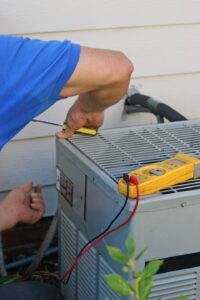A heat pump and a central air conditioner are very similar. However, they do have some key differences that set them apart from one another. Since a heat pump can operate as both an air conditioner and heater, it has some components that a standard central air conditioner does not have.
You can keep reading to learn more about the differences between a heat pump and a central air conditioner. If you have a heat pump and need to schedule an appointment for heat pump repair in Grosse Pointe, MI, our team is here to help. You can give us a call anytime for your HVAC service needs.
What is a Heat Pump?
A heat pump is an HVAC system that offers both heating and cooling all in one. It is unique from all other air conditioners and heaters, which usually have to be separate systems installed alongside each other. A heat pump has unique components that allows it to switch between air conditioning and heating all within the same system.
Reversing Valve
A heat pump is able to switch between heating and cooling because it has a reversing valve. If you had a separate air conditioner and heater, both systems would connect to your thermostat. When you switch between heating and cooling modes, one system would turn off and the other one would turn on. With a heat pump, when you change the settings on your thermostat it also changes the settings on your heat pump.
The reversing valve engages and allows the refrigerant within your heat pump to move in the opposite direction. When your heat pump is in cooling mode, refrigerant cycles in one direction to absorb heat from inside your home and transfer it outside. When the reversing valve is engaged, refrigerant moves in the opposite direction and brings heat into your home from the outside.
Second Expansion Valve
There is always one expansion valve in an air conditioner that uses refrigerant for cooling. However, heat pumps have an additional expansion valve to help lower the pressure of refrigerant when functionality is triggered to reverse. This additional valve serves to add extra power so that your heat pump can change directions more effectively.
Defroster
Your heat pump also needs a defroster to help prevent ice build up on the condenser coils of the outdoor unit when it is cold outside. This isn’t something you have to worry as much about with a traditional air conditioner since it isn’t operating in cold weather. But with a heat pump, refrigerant is also cycling outside to absorb heat and bring it back inside.
Sometimes this cooler refrigerant can allow ice to develop on the coils outside because of the lower temperatures. The defroster inside of your heat pump has a sensor alerting when the outdoor unit gets too cold. When this happens, it triggers for some heat transfer back through the refrigerant as a way of increasing the temperature in preventing this ice buildup.
Suction Accumulator
A traditional air conditioner will not have a suction accumulator, but a heat pump does. Since the refrigerant reverses to move in the opposite direction for heating, it poses a risk of backing up into the air compressor. It only takes a little bit of refrigerant mixing with the oil inside of the compressor to cause problems for your heat pump. It’s an occurrence that is also called slugging and it can lead to problems for the whole unit.
The suction accumulator helps to prevent slugging by trapping any refrigerant before it can mix in with the oil. It’s a great preventive failsafe to help you stay ahead of problems instead of addressing them after the fact.
Contact Charter Home Comfort today to schedule an appointment with our professionals for heat pump service. Old fashioned values with tech savvy results!

